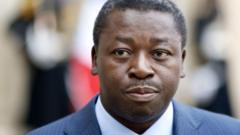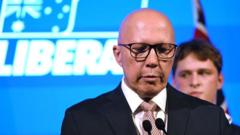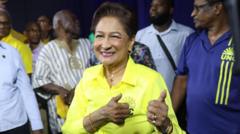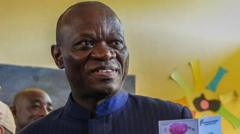Faure Gnassingbé has taken on a new position with no term limits in Togo's government, prompting opposition claims of a move to establish lifelong rule. This shift comes after recent constitutional reforms that eliminated presidential elections, raising alarms among critics and analysts.
Togo's Gnassingbé Assumes New Power Amid Controversy Over Term Limits

Togo's Gnassingbé Assumes New Power Amid Controversy Over Term Limits
Faure Gnassingbé's new role as "President of the Council of Ministers" raises concerns about indefinite rule following controversial constitutional changes.
Togo's political landscape has undergone a significant transformation as Faure Gnassingbé has been sworn in as the "President of the Council of Ministers," the highest office within the executive branch of the government, which notably comes with no term limits. This strategic move follows recent constitutional reforms that have abolished presidential elections and established a parliamentary system, a change that opposition forces claim is designed to ensure President Gnassingbé's indefinite hold on power.
The Gnassingbé family has maintained control over Togo for an extensive period of 58 years, with Faure assuming leadership in 2005 after his father's nearly four-decade rule. The newly crafted constitution, which sparked outcry from critics and opposition officials alike, has been characterized as an "institutional coup d'état."
Despite severe backlash against these reforms, Gnassingbé’s government has pushed forward with the establishment of this new position. Furthermore, Togo's upcoming municipal elections in July are expected to be the first held under the new constitutional framework, which fundamentally transitions the country from a presidential to a parliamentary system.
While the presidency is now ostensibly a symbolic position, political analysts assert that Gnassingbé's authority is now more entrenched than ever through his new role as council president. His political party, the Union for the Republic, solidified its influence by capturing a dominant majority in last year's parliamentary elections, clinching 108 out of 113 seats in the National Assembly. This consolidation of power raises serious questions about the future of democracy in Togo and the possibility of enduring political hegemony under Gnassingbé's rule.



















